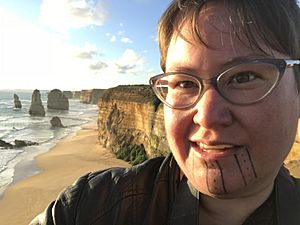TJ Cuthand facts for kids
Quick facts for kids
TJ Cuthand
|
|
|---|---|
 |
|
| Born | 1978 (age 46–47) Regina, Saskatchewan, Canada
|
| Occupation | Artist |
| Years active | 1995–present |
| Parent(s) | |
| Relatives | Lori Blondeau (aunt) |
TJ Cuthand, also known as Theo Cuthand and Thirza Cuthand, is a talented artist. He is a filmmaker, performance artist, writer, and curator. TJ Cuthand has Plains Cree, Scottish, and Irish family roots.
He is known for creating the term Indigiqueer. This word describes modern Indigenous people who identify as LGBTQ+. In May 2022, TJ Cuthand shared that he is a trans man and changed his name to TJ Cuthand.
TJ Cuthand started making video art when he was in high school. He liked to experiment and tell personal stories in his films. His experimental videos often share his own experiences. He explores topics like identity, family background, and relationships.
In 1995, when he was 16, TJ Cuthand attended a workshop at a film festival. This led to his first short video, Lessons in Baby Dyke Theory. This film was shown at festivals around the world.
Contents
About TJ Cuthand
Early Life and Artistic Journey
TJ Cuthand was born in 1978 in Regina, Saskatchewan, Canada. He grew up in Saskatoon surrounded by other artists.
He learned how to make his first video from Maureen Bradley. Other artists who helped him early in his career include Dana Claxton and Shawna Dempsey and Lorri Milan.
In 1995, TJ Cuthand's first short film, Lessons in Baby Dyke Theory, was shown internationally. He was only 16 years old at the time. In 1999, he was chosen for an artist program. There he made Through the Looking Glass. This film was inspired by Lewis Carroll's famous book. In the film, TJ Cuthand plays Alice. He talks with other characters about cultural heritage and identity.
After this early success, he studied film and video. He earned a degree from the Emily Carr University of Art & Design in Vancouver.
TJ Cuthand's Art and Films
TJ Cuthand's artwork has been shown at many festivals and art shows. These include the Whitney Biennial in the USA and the Walker Art Centre. His work has also been featured at the Oberhausen International Short Film Festival in Germany.
He was part of the 2019 Whitney Biennial art show. His film program was called What Was Always Yours and Never Lost.
TJ Cuthand moved to Toronto to be closer to more resources for filmmaking. This helped him grow as an artist and continue making short films. He often funds his own projects. However, he is now working with bigger budgets for his art.
TJ Cuthand is known for creating the term Indigiqueer. This word is used for Indigenous LGBTQ+ people. It can be used instead of, or along with, the term two-spirit. He first used Indigiqueer in 2004 for a film festival program. He explained that he created the term because some LGBTQ+ Indigenous people prefer it. They might not feel that "two-spirit" fully describes their identity.
Awards and Recognition
In 2017, TJ Cuthand received the REVEAL Indigenous Art Award. This award came from the Hnatyshyn Foundation.
In 2021, his short film Kwêskosîw (She Whistles) won several awards. It received a Golden Sheaf for Short Subject-Fiction at the Yorkton Film Festival. It also won the Mana Advancement of Indigenous Rights Award in New Zealand. At the Fantasia festival, it earned the Bronze Audience Award for Best Canadian Short.

